
As 2022 begins, I know we have been working hard to connect and build community in our schools, districts, families, and friend groups. From Comprehensive Distance Learning to hybrid to in-person instruction, these months have been challenging, yet we have found strength and joy together and have been present in moments of sadness. There is no guidebook; however, we have learned to adapt.
We know that having arts and culture in our lives makes us better humans, more compassionate people, and enables empathy. As an arts educator, you have brought out the kid who was quiet, supported the youth who thought they could not succeed, and given the soon-to-be college-bound freshman the courage to take risks and challenge themselves. We applaud you.
Please feel free to share our newsletter with your school community, families, and students. If you have an idea for a story or want to highlight something that is going on in your district or community, please reach out. It is about joy!
– Chanda Evans (she/her), Arts Education Program Specialist
Features & Highlights
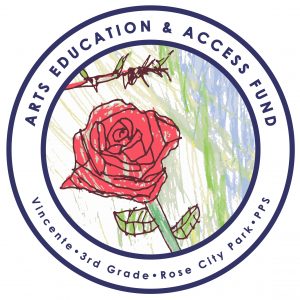
Vincente, Rose Waterfall, logo design 2021
The Arts Education and Access Income Tax is due April 15
Your yearly payment of $35 helps to support arts education in our six school districts – Centennial, David Douglas, Parkrose, Portland Public, Reynolds, and Riverdale. In 2012, this measure was passed by voters in the City of Portland to fund one arts educator for every 500 students. The Arts Education and Access Income Tax Fund (AEAF) also supports our community arts nonprofits through grants administered by RACC. For more information on the AEAF click here.
The AEAF Oversight Committee is charged with ensuring compliance with the 2012 measure. Their meetings are open to the public. For more information click here.
Remind your neighbors, friends, and family to make their yearly $35 online payment here.
________

Congresswoman Suzanne Bonamici (D-OR, District 1)
Arts Education for All Act (H.R 5581).
On Oct. 15, Congresswoman Suzanne Bonamici (D-OR, District 1), Chair of the Education and Labor Subcommittee on Civil Rights and Human Services; Chellie Pingree (D-ME); and Teresa Leger Fernández (D-NM) introduced comprehensive legislation to increase access to arts education. Bonamici hosted a virtual rollout and reception for her Arts Education for All Act (H.R.5581), which addresses equity gaps in access to arts education for K-12 students as well as youth and adults in the justice system. To learn more click here. To advocate for H.R 5581 and to endorse it, click here. To watch our November 5th interview with the Congresswoman, click here.
________
Meet Carol Tatch (she/her), RACC’s Director of External Operations and Director of Philanthropic Innovation.
She shares with us a few of her many passions around the arts.
What is an early memory you have relating to the arts? Does a particular teacher come to mind?
Well, in the case of literary arts, I started reading very early and my mother ensured that we had excellent books to engage our imaginations. When I was in 4th grade I played the flutophone, and that began my engagement with this musical art form. I now play the flute, oboe, viola, clarinet, and my new instrument friend, Lucinda, who is my cello. I have enjoyed the width and breadth of arts and creativity in a gazillion forms: seeing Rodin’s incredible sculpture at his museum in Paris, chasing original Renoirs to gaze at them (he did incredible work with countenances and light) — well, everything, including needle and culinary arts. If I was influenced by any one teacher the most it was my 6th grade band instructor, who saw greater potential for me musically and moved me from the flute to the oboe, a more challenging instrument.
What brought you to philanthropy? What drives innovation?
A happy circumstance brought me into being a philanthropy professional. My first engagements with service happened with my mother, who was always volunteering and bringing her kids along…and we helped. We grew up caring for others and giving back. I was a volunteer and club leader during high school. Being in service has always been a value of mine. While in college, I started working for an international

Pictured with her is Mimicita, who came with the house!
undergraduate, graduate, and professional research organization that has field stations in Central America, South America, and South Africa, as I was in a very different academic study practicum. By the time I finished with college, I was a convert from the sciences to being a philanthropic leader. I remain fully taken by how philanthropy, the love of our fellow humans, is a key component of our lives as humans. Innovation is always driven by the need for change and for things to “get better” in our communities. It is fueled by creativity and thinking outside the box—beyond what we know to what we need. It is amazing and humbling to combine the drives of both to create joy, love, understanding, and support.
What brings you joy when you think about arts/culture education?
What brings me joy are the “little things” that have become pivotal in my journey as I sought my own identity. My first instrument was a flutophone in 4rd grade for our school-wide music program. In 5th grade, every student received a recorder. So, by the time I was in 6th grade, I had decided to play the flute in band (my mother played the clarinet in school—hence my own seeking of clarinet proficiency as an adult). It was a natural progression. My band teacher immediately moved me to an oboe, because he needed an oboist and that was that. I was put in a classroom by myself with the double reed, my first, a cup of water to soak it although he said that the mouth was best, and told to practice blowing through it. As an asthmatic, I learned a new way to breathe. It was fantastic. I still remember the first time I blew a true note with no squeaks. He and I were both excited. I painted, drew, etc. in school. I was fortunate to have full-on engagement with art from kindergarten until I graduated. I am pained that arts education is now a point of negotiation. I want to lean into how this can be relevant here, now. There can be so much joy from arts and cultural engagement. We each have this within ourselves to be so much more.
________
Arts Education Resources
A comprehensive curated resource list from RACC’s Arts Education Program is available for download. Click here.

Bruce Orr, The Scrap Mural, 2019
Professional Development: Trauma Informed Care Workshop Series
The Regional Arts & Culture Council in partnership with Trauma Informed Oregon present a series of workshops for arts educators. Please join us for our third workshop this winter. This free event will be held in March and April remotely, as we continue to center health and safety for all. Look for our Eventbrite invitation in your inbox.
“At a time when students are recovering from the trauma and anxiety of not only the pandemic but the breakdown and failing of many of our institutions, the social and emotional benefits of arts education are more important than ever.” (Art for Life, 2021 Report by the Academy of Arts & Sciences)
________
 RACC will be conducting a spring survey for all K-12 Arts Educators in our six AEAF school districts. The survey will help inform and shape our professional development opportunities which we offer free of charge.
RACC will be conducting a spring survey for all K-12 Arts Educators in our six AEAF school districts. The survey will help inform and shape our professional development opportunities which we offer free of charge.
The Beat: Interviews from the Field
Kelda Van Patten, a Visual Arts Educator
The da Vinci Arts Middle School, Portland Public School District
What inspires you when you teach arts education to your MS students? What makes MS unique in arts education?
Middle School students are definitely unique, in the most wonderful ways! They have a special sense of humor that is infectious. I laugh every day with them. They are energetic, emotional (in a very real way), and lively. As such, I try to keep my curriculum fun and engaging. My class is a time for my students to explore techniques and mediums, while developing their ideas and artistic voice. Adolescents go through so many critical changes as they come in from elementary school, and then, poof, before we know it they are eighth graders getting ready for high school! But really, it’s not “poof.” A lot happens during those three years—educational, artistic, and creative growth, but also social, physical, and emotional changes. It’s a period of intense growth and hormonal changes for many of them, which is just one reason why arts education is so important during these three years. In addition, art is a vehicle to teach so many different subjects in life, and especially a place where students learn that making art is a form of thinking. Art gives my students an outlet, a safe place to express their emotions, ideas, and thoughts. And they have so much to say!

Kelda Van Patten
What have you learned from your students? What do you want them to take away from you?
I learn from my students every day. There are fun facts, like which students would rather be a unicorn or a dragon and why (the why is always very interesting). Over time, I have also learned how important it is to listen to them, and what it really means to listen. There are stereotypes about middle school kids, but really, they are all so unique and different, just like adults. So many of them are mature, responsible, respectful humans, who are very serious about art and learning. However, they are still kids; silly, fun, mischievous, and with so much bubbling energy.
I hope my students remember art in middle school as a place where they could explore a lot of different mediums and techniques; a place where they could freely try out different subject matters that interest them and explore different styles in search of their artistic voice. I want them to think of middle school art as a time where they learned it is okay to fail, and that failure means you tried. I want them to remember how important it is to take creative risks, and what it really means to be mindful and respectful of other people. Even if they take away just one of those concepts, that is big.
What brings you joy when you teach?
Over time I have learned how it is *everything* when I take the time to build relationships. I really strive to be a positive mentor and I would say this is what matters most in teaching, and it is something I have had to not only learn on an intellectual level but how to truly embody it. In the ’70s and ’80s, most of my teachers did not demonstrate this, so I grew up thinking teaching was more about relaying information and knowledge. Of course, I did have a few teachers who took the time to learn my name, and who were happy to see me, even when I was late or made it clear (with sighs and eye rolling) that it was not my favorite class. When I patiently demonstrate what it means to be mindful, and my students in return are patient and kind, THIS brings me so much joy. Of course, I am also so proud of the art they make, and their willingness to take creative risks throughout the creative and artistic process! As an artist who loves working with materials and learning new things, middle school art is so much fun to teach. Do not get me wrong, it is not easy. In fact, teaching middle school is one of the hardest endeavors I have taken on in my life, but it is also rewarding, especially on those days when I seem to ‘get it right.’ I have had to practice what I preach so to speak, and learn that failure is okay, and that the more I fail, the more I learn. This has really played out for me. LOL.
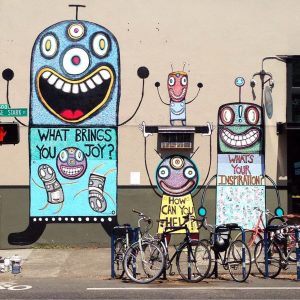
Gary Hirsch, Questions for Humans, 2015
What brings YOU joy?
We would love for you to share your thoughts with this question.
cevans@racc.org.
Student Art Showcase
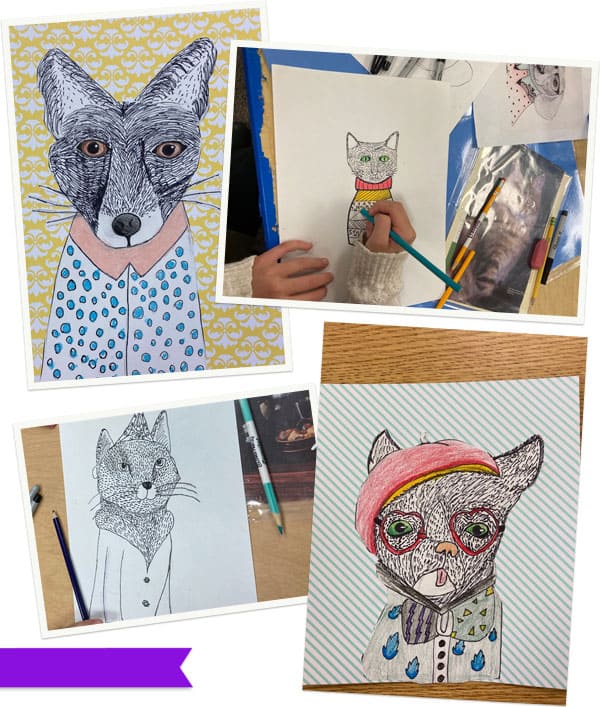
K-5 Buckman Elementary, Portland Public Schools (thank you for sharing!)
More Interviews from the Field
Featured Arts Organization
An interview with Brian Parham (he/him), founder.
Mission statement: Rock Dojo is an award-winning online guitar program for kids. We do not just teach kids about the guitar; we teach kids how to rock out on the guitar! We help students.
When youth participate at Rock Dojo, what do you want them to take away from their experiences? What programs do you offer?
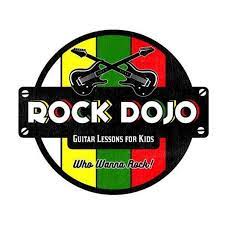 The Rock Dojo is an award-winning online guitar-learning platform for kids. We arose from my passion for sharing guitar with children. I believe in the power of rock inspiration. Our award-winning music education program offers students three paths to a black belt in rock: live online private guitar lessons, live online group guitar lessons, and video-on-demand guitar lessons. In addition, we offer live streaming concerts for school assemblies.
The Rock Dojo is an award-winning online guitar-learning platform for kids. We arose from my passion for sharing guitar with children. I believe in the power of rock inspiration. Our award-winning music education program offers students three paths to a black belt in rock: live online private guitar lessons, live online group guitar lessons, and video-on-demand guitar lessons. In addition, we offer live streaming concerts for school assemblies.
When students participate in the Rock Dojo, the number one skill they walk away with are transferable life skills because learning to play the guitar is challenging. Fortunately, the process of overcoming the challenge of learning to play guitar improves self-esteem and self-discipline, and gives kids transferable skills to last a lifetime. Plus, rocking on a guitar is just plain cool.
How can schools help encourage students to include more music (ROCK!) in the arts?
This past school year left many students isolated from their favorite music activities, but Rock Dojo is here to change that! The discipline that comes with playing the guitar influences positive youth development, engages life skills, and teaches youth the importance of academic resiliency, all of which are proven to help students make academic gains. The Rock Dojo ensures that music education is equitable for all students and those students have access to music education despite the challenges of distance learning. All you need is an internet connection, and students will become rock ninjas in no time!

Brian Parham
To that end, I invite schools to invest in music education for all of their students. Whether it is my arts organization, or any other music program, schools can do a better job of making music education more equitable and accessible to all of their students. They can invest in many ways, including innovative online music programs like Rock Dojo, live performances, and musical instruments for their student body.
When you think of art, what inspires you? (And who are your favorite guitarists?)
I grew up one of five children in a small coal mining town in Pennsylvania. My father worked in a coal power plant, and a single mother raised me. Suffice to say, I did not have many opportunities for personal development as a child.
Thankfully, learning to play the guitar changed all of that. The learning process taught me how to set goals and put in the work to achieve those goals. After beginning my guitar studies at the age of 29, I applied those same skills to every other area of my life. Since then, I have gone on to publish eight books, compose an album, build an award-winning small business, win a scholarship to Berklee College of Music, and so much more!
And that’s what I love about art. Art breaks down barriers. Whether sociological, economic, or cultural barriers, art can overcome any obstacle because creativity is the ultimate superpower. That is why I created the Rock Dojo, and that is why I dedicated the last decade of my life to pass that gift to the next generation of young musicians.
My top three all-time favorite guitarists change all the time, but I would have to say as of right now they are: Albert King, Slash, and Jimi Hendrix.
If any school officials are interested in learning more, they can book a Q&A with me at here.
________
Public Art & Arts Education: Feature Part 1, Fresh Paint Temporary Mural Project
By Salvador Mayoral IV, (he/him), RACC Public Art Senior Specialist
Over the past three decades, Portland has seen a proliferation of murals pop up throughout the city. Adding another dimension to the city’s public art landscape, murals provide a number of benefits to this region such as establishing a location’s identity, preventing unwanted tagging, and providing a platform for community expression. For example, last year’s temporary murals that appeared on the boarded-up windows of stores in the wake of pandemic lockdown and protests of George Floyd’s murder were a great example of this kind expression. Murals provide an opportunity to witness, to feel, and sometimes to heal our collective emotions.
The Regional Arts & Culture Council’s Public Art Murals Program contributes to the city’s public art ecosystem by providing permits and funding to artists, property owners, businesses and community organizations to create murals. My role as a Public Art Senior Specialist is to oversee this distribution of resources and identify other opportunities so that we can continue to support those interested in growing their mural-making practice.
|
 Maria Rodriguez, Bizar Gomez, and Anke Gladnick, 2019 |
 Molly Mendoza 2017 |
 Munta Mpwo, 2019 |
One such opportunity that launched in the last few years is Fresh Paint, a professional development initiative aimed at offering emerging artists of color the chance to create a temporary mural. Fresh Paint is a partnership between RACC and Open Signal, a media arts center carrying a vision for community-driven media focused on creativity, technology, and social change. This partnership provides artists the space to explore working in the public art sector and incorporate new approaches and skills in their artistic practice and experience.
Since the program’s inception in 2017, ten artists have painted murals on Open Signal’s west-facing wall along busy Martin Luther King Jr. Blvd. Many of these artists work in different artistic practices beyond painting, such as graphic design, collage, illustration, and even breakdancing. The imagery these artists chose to present touches upon topics and themes of cultural identity, traditions, family, community, technology, and the empowering of youth. Some of these concepts are lighthearted, others are serious; but all carry a sense of joy and hope.
|
 Rob Lewis 2018 |
 Alex Chiu, 2018 |
 Andrea de la Vega and Damien Dawahare, 2018 |

Limei Lai, 2020
One of our most recent artists, Limei Lai, said of her mural, Together, depicting three generations of women within a family: “The world is extremely beautiful and fun in the kid’s eyes; it is a complex chaos in the woman’s eyes; it is where the loved ones live in grandma’s eyes. The present and the past, the here and there, we are all in this world together, weeping and smiling and hugging, celebrating women’s lives and the world community. We dance with the unknown, changes, and aging, in the dark and in the sun, with the flowers and with the birds.”
For a database of public art in the Portland region, click here.
Workshops • Events • Lectures*
Sign-up for alerts about lectures, workshops, events, and conferences from local colleges and universities. Here are a few highlights:

Liz Tran, A Heaviness
January-February-March 2022
Serving Portland artists and audiences, the 2022 Fertile Ground Festival, a program of the Portland Area Theatre Alliance (PATA), will be held January 27-February 6, 2022. Fertile Ground 2022 will be in a virtual format, and uncurated.
32nd African Film Festival, February 2022 (various venues).
7thAnnual Portland Winter Light Festival, February 4-12 (free). Walking tour of light installations across the city. Click here for more information.
The Kennedy Center, national partnerships convening. February 7-8, 2022, Any Given Child; February 8-9, 2022, Partners in Education Annual Meeting. VIRTUAL.
2022 Biamp Portland Jazz Festival February 17-26, 2022 (various venues).
Frida Kahlo, Diego Rivera, and Mexican Modernism open at the Portland Art Museum, February 19-June 5, 2022.
Educator Workshop: Look Club at the Portland Art Museum, February 26, 2022. Subsequent dates will be: March 12, April 30, and May 14.
Free days at the Portland Art Museum March 20th and April 24th ( Heart of Portland with Portland Public Schools).
National Art Education Association National Convention, March 3-5, 2022, virtually and in person in New York City.
45th Portland International Film Festival (PIFF), March 5-14, 2022.
If you know of an event, workshop, lecture, or art exhibition that is coming up please go here to submit an opportunity.
*Please note: Some workshops/events/lectures might have changed due to COVID-19. Please check before you make plans.
The Scoop – Grow your Brain
We are often curious of what research is happening behind the scenes in the space of arts education. Take a look by clicking the images!
Thanks to all of our partners, supporters, and funders supporting arts education.
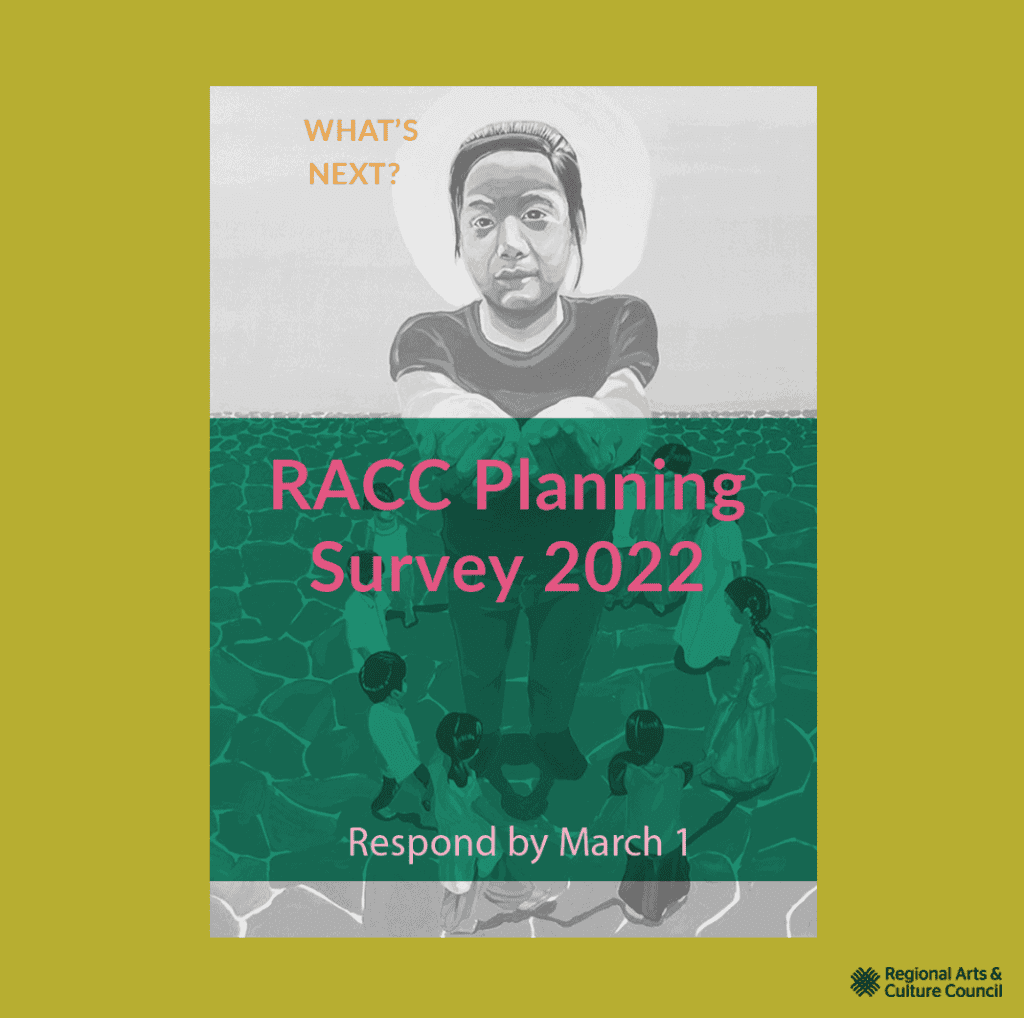



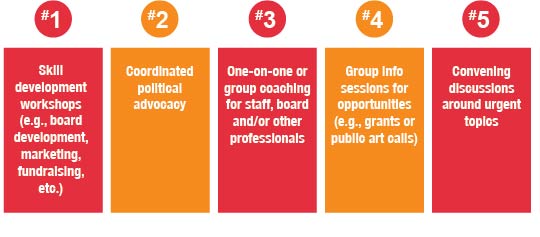





 RACC will be conducting a spring survey for all K-12 Arts Educators in our six AEAF school districts.
RACC will be conducting a spring survey for all K-12 Arts Educators in our six AEAF school districts.


 The Rock Dojo is an award-winning online guitar-learning platform for kids. We arose from my passion for sharing guitar with children. I believe in the power of rock inspiration. Our award-winning music education program offers students three paths to a black belt in rock: live online private guitar lessons, live online group guitar lessons, and video-on-demand guitar lessons. In addition, we offer live streaming concerts for school assemblies.
The Rock Dojo is an award-winning online guitar-learning platform for kids. We arose from my passion for sharing guitar with children. I believe in the power of rock inspiration. Our award-winning music education program offers students three paths to a black belt in rock: live online private guitar lessons, live online group guitar lessons, and video-on-demand guitar lessons. In addition, we offer live streaming concerts for school assemblies.











